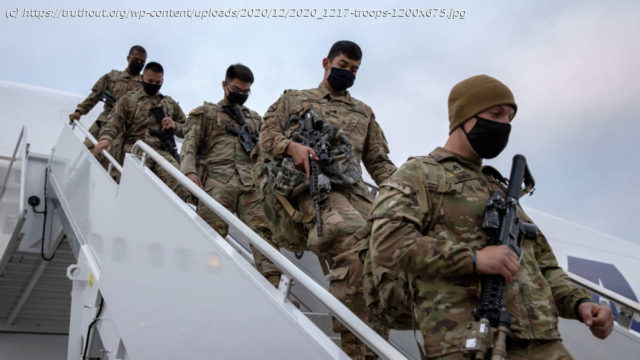The „war on terror“ has truly become a war of generations.
It was the end of October 2001. Two friends, Max Elbaum and Bob Wing, had just dropped by. (Yes, children, believe it or not, people used to drop in on each other, maskless, once upon a time.) They had come to hang out with my partner Jan Adams and me. Among other things, Max wanted to get some instructions from fellow-runner Jan about taping his foot to ease the pain of plantar fasciitis. But it soon became clear that he and Bob had a bigger agenda for the evening. They were eager to recruit us for a new project. And so began War Times/Tiempo de Guerras, a free, bilingual, antiwar tabloid that, at its height, distributed 100,000 copies every six weeks to more than 700 antiwar organizations around the country. It was already clear to the four of us that night — as it was to millions around the world — that the terrorist attacks of September 11th would provide the pretext for a major new projection of U.S. military power globally, opening the way to a new era of “all-war-all-the-time.” War Times was a project of its moment (although the name would still be apt today, given that those wars have never ended). It would be superseded in a few years by the explosive growth of the Internet and the 24-hour news cycle. Still, it represented an early effort to fill the space where a peace movement would eventually develop. We were certainly right that the United States had entered a period of all-war-all-the-time. It’s probably hard for people born since 9/11 to imagine how much — and how little — things changed after September 2001. By the end of that month, this country had already launched a “war” on an enemy that then-Secretary of Defense Donald Rumsfeld told us was “not just in Afghanistan,” but in “50 or 60 countries, and it simply has to be liquidated.” Five years and two never-ending wars later, he characterized what was then called the war on terror as “a generational conflict akin to the Cold War, the kind of struggle that might last decades as allies work to root out terrorists across the globe and battle extremists who want to rule the world.” A generation later, it looks like Rumsfeld was right, if not about the desires of the global enemy, then about the duration of the struggle. Here in the United States, however, we quickly got used to being “at war.” In the first few months, interstate bus and train travelers often encountered (and, in airports, still encounter) a new and absurd kind of “security theater.” I’m referring to those long, snaking lines in which people first learned to remove their belts and coats, later their hats and shoes, as ever newer articles of clothing were recognized as potential hiding places for explosives. Fortunately, the arrest of the Underwear Bomber never led the Transportation Security Administration to the obvious conclusion about the clothing travelers should have to remove next. We got used to putting our three-ounce containers of liquids (No more!) into quart-sized baggies (No bigger! No smaller!). It was all-war-all-the-time, but mainly in those airports. Once the shooting wars started dragging on, if you didn’t travel by airplane much or weren’t deployed to Afghanistan or Iraq, it was hard to remember that we were still in war time at all. There were continuing clues for those who wanted to know, like the revelations of CIA torture practices at “black sites” around the world, the horrors of military prisons like the ones at Bagram Air Force Base in Afghanistan, Abu Ghraib in Baghdad, and the still-functioning prison complex at Guantánamo Bay, Cuba. And soon enough, of course, there were the hundreds and then thousands of veterans of the Iraq and Afghan wars taking their places among the unhoused veterans of earlier wars in cities across the United States, almost unremarked upon, except by service organizations. So, yes, the wars dragged on at great expense, but with little apparent effect in this country. They even gained new names like “the long war” (as Donald Trump’s Secretary of Defense James Mattis put it in 2017) or the “forever wars,” a phrase now so common that it appears all over the place. But apart from devouring at least $6.4 trillion through September 2020 that might otherwise have been invested domestically in healthcare, education, infrastructure, or addressing poverty and inequality, apart from creating increasingly militarized domestic police forces armed ever more lethally by the Pentagon, those forever wars had little obvious effect on the lives of most Americans. Of course, if you happened to live in one of the places where this country has been fighting for the last 19 years, things are a little different. A conservative estimate by Iraq Body Count puts violent deaths among civilians in that country alone at 185,454 to 208,493 and Brown University’s Costs of War project points out that even the larger figure is bound to be a significant undercount: “Several times as many Iraqi civilians may have died as an indirect result of the war, due to damage to the systems that provide food, health care, and clean drinking water, and as a result, illness, infectious diseases, and malnutrition that could otherwise have been avoided or treated.” And that’s just Iraq. Again, according to the Costs of War Project, “At least 800,000 people have been killed by direct war violence in Iraq, Afghanistan, Syria, Yemen, and Pakistan.






